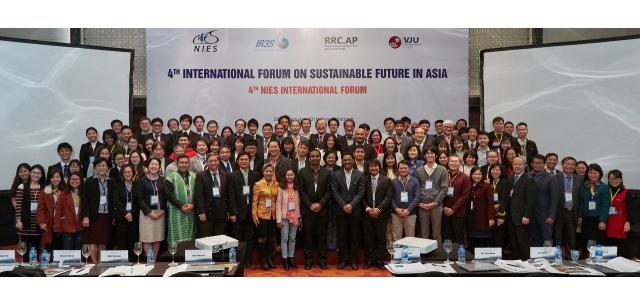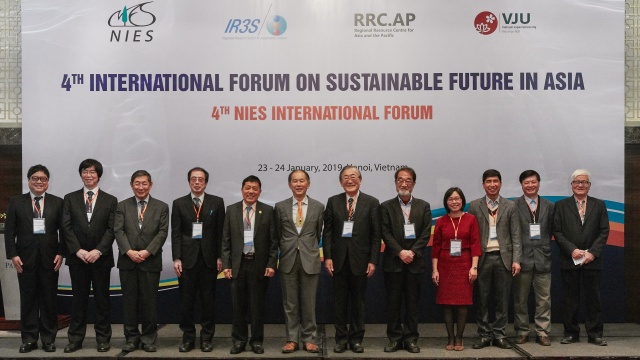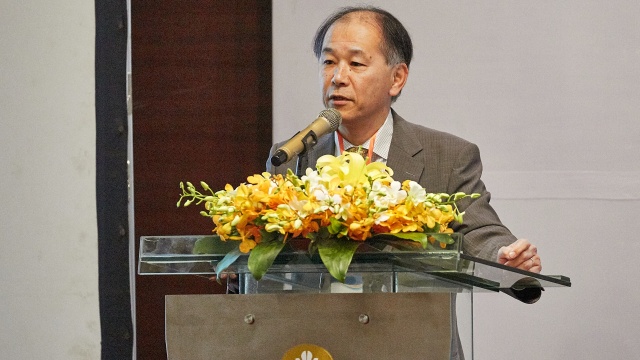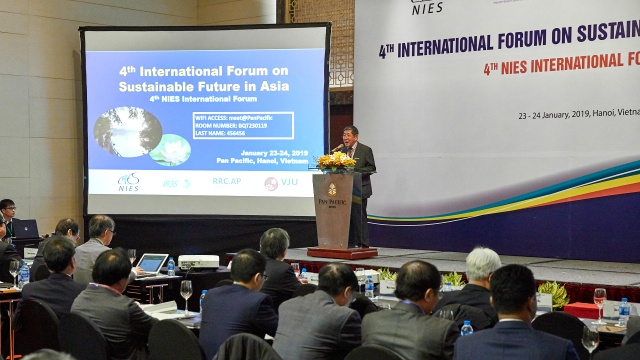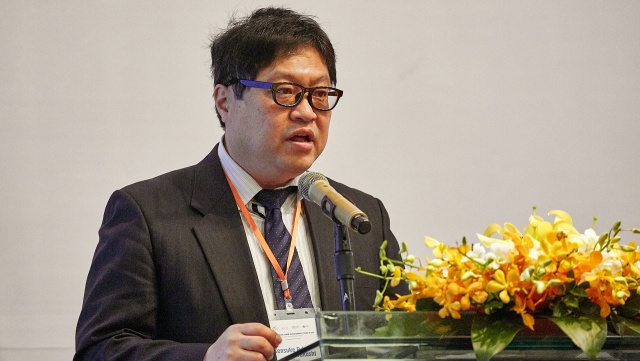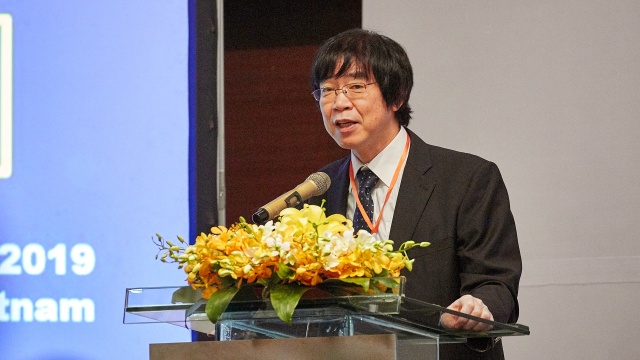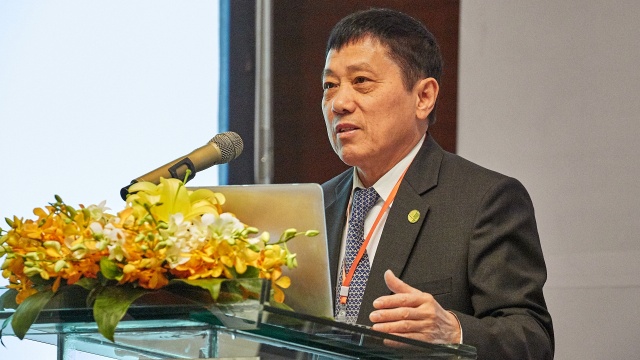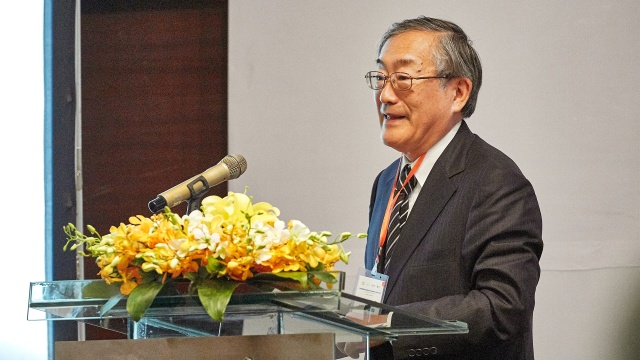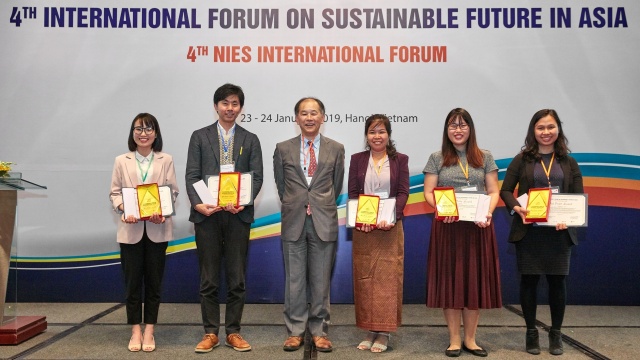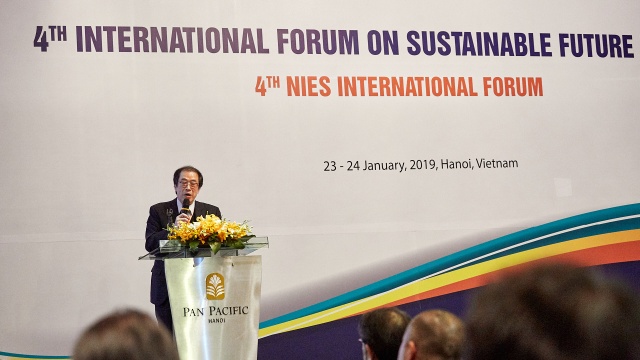4th International Forum on Sustainable Future in Asia 4th NIES International Forum
January 23-24, 2019 Pan Pacific Hanoi, Hanoi, Vietnam
- Top
- About
- Program
- Speakers
- Presentations
- Posters
- Report
The 4th International Forum on Sustainable Future in Asia/4th NIES International Forum concluded with a success with 34 presentations, 55 poster presentations and approximately 150 participants.
| Date | January 23-24, 2019 |
|---|---|
| Venue | Pan Pacific Hanoi, Hanoi, Vietnam |
| Registration | Free. Online registration is closed. |
| Proceedings | IOP Conf. Series: Earth and Environmental Science, Vol. 266, 2019 |
| Organizer | National Institute for Environmental Studies (NIES - Japan) |
| Co-organizers | The University of Tokyo Institutes for Advanced Study, Integrated Research System for Sustainability Science (IR3S, UTokyo - Japan) AIT Regional Resource Centre for Asia and the Pacific (AIT RRC.AP -Thailand) Vietnam Japan University (VJU - Vietnam) |
Contact
National Institute for Environmental Studies (NIES)
16-2 Onogawa, Tsukuba, Ibaraki 305-8506 JAPAN
Background and Objectives
The National Institute for Environmental Studies (NIES) is undertaking a broad range of environmental research toward the realization of sustainable societies. To disseminate the outcomes of this research at NIES and to bridge the gaps between science and policy, in 2016 NIES initiated the Forum on Sustainable Future in Asia in collaboration with the University of Tokyo and the Asian Institute of Technology. The 4th International Forum on Sustainable Future in Asia will be held in Vietnam on January 23 and 24, 2019. The aim of the forum is to create a foundation for a consortium of relevant institutions and governments in the region that will facilitate the exchange of knowledge gained through research and catalyze dialogue at the policy–research interface in the spheres of environmental management and sustainable development in Asia.
Session Overview
1. Research into Practice: A multi-disciplinary approach to solid waste management research with the aim of reducing flood risk in Asian cities
The flooding that often happens after high-intensity precipitation in urban areas is caused mainly by a lack of drainage capacity. One of the common causes of urban flood in Asian cities is the blockage of drainage by inappropriate disposal of solid waste. This session introduces research into the mechanisms by which solid wastes block drainage systems and proposes science-based guidance on the periodic maintenance of drainage systems as a public service. Through clarification of the institutional and psychological factors that discourage residents and businesses from disposing of waste appropriately, ways of improving current waste management systems and policies will be discussed.
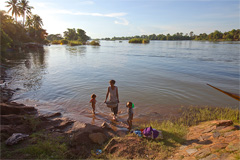
2. New strategies for adaptation of the Mekong River watershed to environmental change
In this session, we have invited prominent researchers from each country included in the Mekong watershed to report on the adaptation strategies being implemented against climate change. The catchphrase is “a new adaptation strategy to support a sustainable society in Southeast Asia.” Specifically, we will report on, and discuss, the following three items: 1) high-level evaluation of the present situation with open data 2) a future regional design that combines green infrastructure and gray infrastructure 3) strategic consensus-building based on wide-area risk analysis and evaluation. We will use the findings from these discussions to exchange information and realize a more resilient community as a fresh and innovative measure for mitigating climate change.
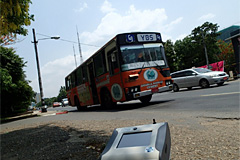
3. Our Environment, Our Health: Improving public health through research on the environment in Asian countries
Concern over the state of the environment is growing rapidly worldwide. Industrialization and urbanization, along with economic development, have led to sharp increases in energy consumption and waste production. Environmental changes and exposure to environmental contaminants damage health in various ways, and it is time to take action and control these problems. Novel approaches, such as new monitoring and screening techniques, are needed to help us better understand how combinations of contaminants and environmental changes influence human health and determine which combinations are the most harmful or require urgent study. In this session, we will introduce recent research findings regarding environmental changes and exposure to environmental contaminants in Asian countries. We will also host a discussion to foster collaboration between NIES and Asian countries and thus promote the development of an Environmental Research Network.

4. Integrated Reseach: Strategic research for societal transformation and Sustainable Development Goals
Global society is faced with “transformation points” along the path to decarbonization, as well as the need to ensure that there are regions of resilience against the rapidly growing risks of climate change. The growing economies of Asia are certain to be vulnerable to climate risks. Adaptive and mitigative measures are being considered with increased urgency as solutions that facilitate smarter growth of the economy and public welfare in response to scientific forecasting of global warming impacts. While promoting appropriate actions, we also need to focus on alternative mechanisms of strengthening suitable measures through networking and the reduction of vulnerability through cooperation. Science alone cannot provide solutions, and it is important for scientists to work closely with their governments to promote appropriate policy actions. Synergetic actions bridging adaptation and mitigation will be discussed interactively in this session. The session will approach these issues from both sides in discussing how to synergize adaptation and mitigation actions in Asia.
Day1 January 23, 2019
Opening Session and Keynote Speeches 8:30-9:50
-
Opening Remarks8:30-8:50
- Dr. Chiho Watanabe (President, National Institute for Environmental Studies)
- Dr. Jun Nakajima (Special Advisor to the Rector, Co-Director of Master Program of Environmental Engineering, Vietnam Japan University)
- Prof. Keisuke Fukushi (Professor, Integrated Research System for Sustainability Science, Institutes for Advanced Study, The University of Tokyo, Japan)
- Mr. Naoya Tsukamoto (Director, AIT Regional Resource Centre for Asia and the Pacific, Thailand)
-
Keynote Speeches8:50-9:50
-
Synergy of Climate Change Adaptation, Mitigation and Sustainable Development
: Lessons from Vietnam
Prof. Mai Trọng Nhuan
(Former President of Vietnam National University, Hanoi) -
Vietnam Japan University and Sustainable Development
Prof. Motoo Furuta (Rector of Vietnam-Japan University)
-
Synergy of Climate Change Adaptation, Mitigation and Sustainable Development
: Lessons from Vietnam
-
Group Photo and Coffee Break9:50-10:05
Session 110:05-12:45
Research into Practice: A multi-disciplinary approach to solid waste management research with the aim of reducing flood risk in Asian cities
-
Session Coordinator and ChairDr. Tomonori Ishigaki (NIES)
-
Session keynote lecture
-
Synergies of Urban Adaptation to Flood Risk, Public Open Space and Solid Waste Management
Dr. Vilas Nitivattananon (AIT)
-
Synergies of Urban Adaptation to Flood Risk, Public Open Space and Solid Waste Management
-
Presentations
-
Urban Flood Caused by Inappropriate Waste Management in Asia: Adaptation to Climate Change
Dr. Tomonori Ishigaki (NIES) -
Solid Waste Characterization in Bangkok Canals and its Impact to Drainage Function of Combined Sewer System
Dr. Chart Chiemchaisri (Kasetsart University) -
Experimentation of Solid Waste Blockage in Drainage System: Effect of Waste Material and Flow Velocity
Mr. Rawit Thaweesub (Rangsit University) -
Numerical Simulation on Drainage Capacity Loss at a Bar Screen Blocked by Wastes in a Canal
Dr. Kosuke Nakamura (NIES)
-
Urban Flood Caused by Inappropriate Waste Management in Asia: Adaptation to Climate Change
-
Break
-
Presentations
-
Factors Related to Waste Disposal Behaviour of Residents near Canals
Ms. Rieko Kubota (NIES) -
Appropriate Management of Construction and Demolition Waste to Prevent Waterway Blockage
Ms. Han Hoang (NIES)
-
Factors Related to Waste Disposal Behaviour of Residents near Canals
-
Panel Discussion
-
Flash Poster Presentation Part 112:45-13:15
-
Poster Session / Lunch13:15-14:30
Session 214:30-17:50
New strategies for adaptation of the Mekong River watershed to environmental change
-
Session CoordinatorDr. Satoshi Kameyama, Dr. Manabu Onuma, Dr. Naishen Liang (NIES)
-
ChairDr. Naishen Liang (NIES)
-
Session keynote Lecture
-
New Adaptation Strategies to Support a Sustainable Watershed Management in Asia
Dr. Satoshi Kameyama (NIES)
-
New Adaptation Strategies to Support a Sustainable Watershed Management in Asia
-
Presentations
-
Study on Coastal Protection and Production Functions of Mangrove Vegetation in Thanh Phu Natural Reserve, Mekong Delta, Vietnam
Dr. Nguyen Thi Kim Cuc(Vietnam National University) -
The Mekong River Basin under Environmental Change: Evidence from Modeling Studies
Dr. Sangam Shrestha (AIT) -
Health Vulnerabilities, and Response Preparedness of Myanmar (Migrant) Women to Climate Change and Variability in Golden Triangle Area, Greater Mekong Sub-region
Dr. Wynn Htut Aung (Thammasat University) -
SEAP: a Spatial data Exploration and Analysis Platform for Monitoring Environment Change
Dr. Bui Quang Hung (Vietnam National University)
-
Study on Coastal Protection and Production Functions of Mangrove Vegetation in Thanh Phu Natural Reserve, Mekong Delta, Vietnam
-
Coffee Break
-
Presentations
-
Open data can Play a Key Role in Informing Discussion and Decision-making around Climate Change
Mr. Try Thy (Open Development Cambodia) -
Air Pollution Monitoring Using Low-cost Sensor Network, a Case Study in Hanoi, Vietnam
Dr. Thi Nhat Thanh Nguyen (Vietnam National University) -
Environmental Changes Monitoring and Assessment in Lancang River Basin under Impact of Hydropower Development
Prof. Ying Lu (Yunnan University) -
Coastal Adaptation Mixing Gray and Green Infrastructures to Climate Change in Vietnam
Dr. Makoto Tamura (Ibaraki University)
-
Open data can Play a Key Role in Informing Discussion and Decision-making around Climate Change
-
Discussion
Day2 January 24, 2019
Session 38:30-11:50
Our Environment, Our Health: Improving public health through research on the environment in Asian countries
-
Session Coordinator and ChairDr. Le Ke Son (Vietnam Association of Occupational Safety and Health) Dr. Shoji F. Nakayama and Dr. Tin Tin Win Shwe (NIES)
-
Greeting from ChairpersonDr. Le Ke Son (Vice Chairman of Vietnam Association of Occupational Safety and Health, Former Vice Director General, Vietnam Environmental Administration)
-
Session keynote lecture
-
How is our Environment related with our Health?
Dr Chiho Watanabe (President, NIES)
-
How is our Environment related with our Health?
-
Presentations
-
Site-specific Bioaccumulation of PCDD/PCDFs in Mothers and their Infants Living in Vicinity of Bien Hoa Airbase, Southern Vietnam
Dr Nguyen Hung Minh (Vietnam Environment Administration) -
Environmental Pollutants and their Health Effects in Myanmar
Prof. Ohn Mar (University of Medicine 1, Myanmar) -
Pesticides Use in Thailand and Developmental Effects on Children
Dr. Tippawan Prapamontol (Chiang Mai University) -
Environmental Arsenic Exposure and Human Health in the Mekong River Basin of Cambodia
Dr Kongkea Phan (International University, Cambodia)
-
Site-specific Bioaccumulation of PCDD/PCDFs in Mothers and their Infants Living in Vicinity of Bien Hoa Airbase, Southern Vietnam
-
Coffee Break
-
Presentations
-
Air Pollution and their Health Efects in Monglia
Dr. Dr. Otgonjargal Damdinbaljir (National Centre of Public Health, Ministry of Health, Mongolia) -
Haze Situation in Lao PDR
Dr. Ketkesone Phrasisombath (University of Health Sciences, Laos) -
Safety Managed Water Services beyond SDG
Dr. Ikuro Kasuga (Vietnam Japan University) -
Heat Stress Impact on Urban Population in Asian Countries -Case of Japan and Vietnam
Dr. Marcin Pawel Jarzebski (IR3S, UTokyo)
-
Air Pollution and their Health Efects in Monglia
-
Panel discussion about Potential Collaboration
-
Flash Poster Presentation Part 211:50-12:20
-
Poster Session / Lunch12:20-13:40
Session 413:40-16:40
Integrated Research : Strategic research for societal transformation and Sustainable Development Goals
-
Session Coordinator and ChairProf. Kensuke Fukushi (IR3S, UTokyo) and Prof. Tsuyoshi Fujita (NIES)
-
Session keynote lecture
-
Challenge to the Future Society: How to Attack a Complex Problem
Prof. Akimasa Sumi (UTokyo)
-
Challenge to the Future Society: How to Attack a Complex Problem
-
Presentations
-
International Collaboration in Climate Change Adaptation for Local Government
Prof. Kensuke Fukushi (IR3S, UTokyo) -
Addressing Climate Change in the Water Sector: The study of small Run-of-river Hydro Power Potential in Vu Gia - Thu Bon River Basin of Vietnam
Dr. Lan Huong Nguyen (National University of Civil Engineering, Vietnam) -
Building Endogenous Capacity in Asia and the Pacific to Access Climate Finance
Dr. Naoya Tsukamoto (AIT RRC.AP)
-
International Collaboration in Climate Change Adaptation for Local Government
-
Coffee break
-
Presentations
-
Climate Change Adaptation in the Agricultural Sector: An Asian Perspective
Dr. Avishek Datta (AIT) -
Mainstreaming Climate Change Adaptation and Mitigation into Sub-National's Medium & Long-term Development Plan
Prof. Rizaldi Boer (Bogor Agricultural University) -
Integrative Research for Strategic Project Design toward Sustainable Development Goals in Asian Cities
Prof. Tsuyoshi Fujita (NIES)
-
Climate Change Adaptation in the Agricultural Sector: An Asian Perspective
Wrap-Up and Closing Session16:40-17:30
-
Session Wrap-Up
-
Joint Statement
-
Announcement of Awarded Posters
-
Closing RemarksDr. Hideo Harasawa (Vice President, NIES)
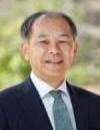
Dr. Chiho Watanabe
President, National Institute for Environmental Studies, Japan
Having background in toxicology and nutrition, he has conducted many experimental and field studies (mostly in Asia) on toxicant-nutrient-life style interactions and their health impacts, including such an interaction between mercury or arsenic and selenium in Asian populations. He has been also engaged in many inter-disciplinary projects/initiatives associated with the issue of sustainability and health; in his recent project, GRENEcoH, in which 'earth' observation, 'human' observation, and 'health' observation data have been combined to solve the challenging issues in the area of ecohealth. He has been serving as president of Society of Health and Human Ecology (JAPAN), vice-president of Society of Human Ecology (international) and was the chair of Human Ecology section in Ecological Society of America.

Dr. Jun Nakajima
Special Advisor to the Rector/Co-Director of Master Program of Environmental Engineering, Vietnam Japan University, Vietnam
After around 20 years research and education in Department of Environmental Systems Engineering of Ritsumeikan University, Dr. Jun Nakajima has moved to Vietnam and is focusing on the JICA project promotion for establishment of the master program of Vietnam Japan University, VNU-Hanoi. He had been a researcher in an institute of Chiba Prefectural Government more than 20 years before his activities in Ritsumeikan University. His study topics are based on sustainability science related to water environmental engineering including water reclamation and reuse, membrane bioreactor, arsenic mitigation, nutrient removal, lake water management, safe water and sanitation in developing countries, etc. From 2011 to 2013 he was President of Japan Society on Water Environment (JSWE).

Prof. Kensuke Fukushi
Professor, The University of Tokyo Institutes for Advanced Study, Integrated Research System for Sustainability Science, Japan
Prof. Fukushi obtained his Bachelor of Engineering and Master of Engineering in Civil Engineering from Tohoku University, Japan in 1989 and 1991 respectively. He received his Ph.D. in Civil Engineering from the University of Utah, U.S.A. in 1996. He joined Tohoku Univ. in 1996 as Research Associate and promoted to be Assistant Professor in 1997. He served as Assistant Professor at Asian Institute of Technology(AIT), Thailand in 1999 and became Associate Professor in 2001. Then he joined Environmental Science Center, The University of Tokyo (UTokyo) as Associate Professor and moved to the Integrated Research System for Sustainability Science, UTokyo in 2005. His research interests include environmental engineering, risk assessment, climate change effect, water resource, biological technology, membrane technology. His research projects cover the integrated climate assessment – risks, uncertainties and society, establishment of research platform for developing models to predict future health risks posed by changes in climate, land use and population, development of international network for sustainability science and on health risk assessment in urban area.

Mr. Naoya Tsukamoto
Director, AIT Regional Resource Centre for Asia and the Pacific, Thailand
Mr. Naoya Tsukamoto obtained a Master of Environmental Science from Johns Hopkins University, USA in 2005 and a Bachelor of Physics from University of Tokyo, Japan in 1985. He started his professional career at the Ministry of the Environment of Japan in 1985. During 2005-2008, he served as the Head of Japanese Delegation to the IPCC/AR4. During 2014-2016, he worked for the Institute for Global Environmental Strategies (IGES) as Secretary-General/Principal Researcher. During 2016-2018, he serves as Project Director under the United Nations University, Institute for the Advanced Study of Sustainability (UNU-IAS). He is currently Director of Regional Resource Centre for Asia and the Pacific (RRC.AP) in Asian Institute of Technology (AIT), Bangkok, Thailand.

Prof. Dr. Mai Trong Nhuan
Former President, Vietnam National University, Vietnam
Prof. Dr. Mai Trong Nhuan, former President of Vietnam National University, Hanoi, is a MONRE and Bao Son awards winning environmentalist/earth scientist. He is a Vice Chairman of Vietnam Panel on Climate Change, Director of VNU Key Lab of Geoenvironment and Climate Change Response, Deputy Director of Vietnam National Science and Technology Program for Sustainable Development of North West Vietnam. He serves as a national distinguished expert and advisor in education and science. He is the author and co-author of eight books, about 100 papers in international and national journals and leader of National and ministerial scientific projects concerning the earth sciences, climate change impact and response, disaster mitigation, natural resources and environmental management for sustainable development and proactive response to extreme events, environment change for ensuring non-traditional security. He was one of the lead authors of IPCC report 2001, and review editors of chapter 9 of IPCC, 2012 SREX.

Prof. Motoo Furuta
Rector, Vietnam Japan University, Vietnam
Date of Birth; Oct.4, 1949 Speciality; Modern History of Vietnam Former Vice President of the University of Tokyo (2004~2007) Professor emeritus, the University of Tokyo (2015) From Apr.2016 Rector, Vietnam Japan University (Vietnam National University, Hanoi)

Dr. Vilas Nitivattananon
Associate Professor, Asian Institute of Technology, Thailand
Dr. Vilas Nitivattananon is an Associate Professor of Urban Environmental Management Program under School of Environment, Resources and Development, Asian Institute of Technology (AIT). He is also a Visiting Faculty of Ho Chi Minh City University of Technology, Vietnam. He has a strong background in engineering, economics and systems management, with a focus on urban environmental management and infrastructure development. 19
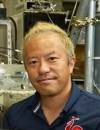
Dr. Tomonori Ishigaki
Senior Researcher, National Institute for Environmental Studies, Japan
Dr. Ishigaki, who has an academic background in environmental engineering and bioengineering, works on development of technology on appropriate management on solid waste in Japan and in Asian region. He is involved in various national projects on safety disposal of hazardous waste and disaster waste management as an expert in the field. He is also involved in authoring the documents of IPCC and the global standardization of solid recovered fuels in ISO.

Dr. Chart Chiemchaisri
Associate Professor, Kasetsart University, Thailand
Dr. Chart Chiemchaisri is currently an associate professor at Department of Environmental Engineering, Faculty of Engineering, Kasetsart University, Thailand. He received his Bachelor degree in Civil Engineering from Chulalongkorn University, Master of Environmental Engineering from Asian Institute of Technology and Doctor of Engineering in Environmental Engineering from The University of Tokyo, Japan. He has involved in several international research projects related to solid waste management such as Sustainable solid waste landfill management in Asia, Appropriate waste management landfill operations in Thailand. His current research interest include municipal solid waste management focusing on landfill processes, leachate treatment and greenhouse gas emissions.
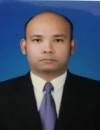
Mr. Rawit Thaweesub
Lecturer, Rangsit University, Thailand
Mr. Rawit Thaweesub is currently a Lecturer at Department of Industrial Technology, College of Engineering, Rangsit University, Thailand. He received his Bachelor degree in Mechanical Engineering and Master in Environmental Engineering from Kasetsart University, Thailand. He has involved in several projects related to energy efficiency and waste management such as municipal wastewater treatment and collection system in Thailand. He is studying in Doctoral degree of Environmental Engineering at Kasetsart University.
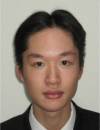
Dr. Kosuke Nakamura
Research Associate, National Institute for Environmental Studies, Japan
Mr. Kosuke Nakamura is a research associate at Fukushima Branch, National Institute for Environmental Studies, Japan. He received his bachelor’s degree (engineering), master’s degree (environmental studies), and doctor’s degree (environmental studies) in Tohoku University, Japan. His life has been always with video games, full of three-dimensional computer graphics and physics. This nature leaded him into fields of numerical simulation for water flow and soil deformation. His computer program for numerical simulation was later extended to kinematic behaviours of wastes in water.

Ms. Reiko Kubota
International Project Coordinator, National Institute for Environmental Studies, Japan
Rieko has more than 15 years of experience in leading projects in developing countries. She is specialized in the governance and policies related to waste management issues of ASEAN countries. With her professional background in the region, combined with academic background in economics and policy studies, Rieko engages in multiple researches/projects on institutional and mechanical designs of waste management issues. She is an enthusiast of transition of research into practice in the area of environmental policies.

Ms. Han Hoang
Junior Research Associate, National Institute for Environmental Studies, Japan
Ms. Han Hoang works in the field of environmental management. As a member of NIES’ Center for Material Cycles and Waste Management Research, she is currently working on a project under the joint JICA-JST programme, SATREPS, aiming to develop environmentally sound Construction and Demolition Waste (CDW) management and resource recycling systems in Vietnam. NIES gets involved in the project as the core implementation agency of the project component four on proposing strategic business models for promoting CDW recycling in Vietnam.

Dr. Satoshi Kameyama
Senior Researcher, National Institute for Environmental Studies, Japan
Dr. Satoshi Kameyama is a senior researcher at Center for Environmental Biology and Ecosystem Studies, NIES-JAPAN. He is a research professor at The Kyoto University C-PIER and a lecturer at The University of Tokyo The Graduate School of Agriculture and Life Science in 2018. He is also working as visiting lecturer at VNU (Vietnam Japan University) in Hanoi. He received Ph.D. degrees from The Graduate School of Agriculture from The Hokkaido University in 1999. He is an editorial board member of The Remote Sensing Society of Japan from 2011. The main research topics of recent years are “Evaluation of ecosystem functions and services and their sustainable use” and “Watershed ecosystem restoration based on the recovery of migration pass and diadromous fish habitat using Environmental DNA” etc. The final goal (the dream) of his research is to realize sustainable regional community with high resilience to climate change harmonizing with nature.

Dr. Manabu Onuma
Senior Researcher, National Institute for Environmental Studies, Japan
Dr. Manabu Onuma is a senior researcher belonging to Center for Environmental Biology and Ecosystem Studies at National Institute for Environmental Studies (NIES), Japan. He is in charge of managing a genetic resource bank for endangered species in Japan. Genetic resources collected from around 100 species were cryopreserved in NIES cryopreserving facilities called the Time Capsule Building since 2002. He is trying to expand the genetic resource banking project to other country in Asian region, especially Southeast Asia. Because most of the part of Southeast Asia is categorized as biodiversity hotspots.

Dr. Naishen Liang
Head, National Institute for Environmental Studies, Japan
As native of Luoyang in Central China, he received his undergraduate education in forestry science and MS in ecophysiology (Beijing Forestry University), and PhD in ecophysiology (Niigata University, Japan). His postdoc training (Japan Science and Technology Corporation) was in tropical forest carbon cycle (1997- 2000). He was a Research Fellow (National Institute for Environmental Studies) in boreal forest carbon cycle (2001-2005). His research is on terrestrial ecosystem carbon cycle and its interactive feedbacks to climate change and natural and human disturbances. With supports of continuous competitive funding from the Ministry of the Environment of Japan, his current research projects focus on response, feedback and adaptation of the monsoon Asian soil organic carbon (SOC) dynamic to global warming.

Dr. Nguyen Thi Kim Cuc
Associate Professor, Thuyloi University, Vietnam
Assoc.Prof.Dr. NGUYEN Thi Kim Cuc holds a PhD. degree of Forest Ecology from Ehime University, Japan with a dissertation on Ecology of mangroves. She undertook a Postdoct research on Climate change Adaptation at IHE-UNESCO, the Netherland. She has been a researcher at MERD /VNU-CRES from 1998 and lecturer at Thuyloi University from 2009. She currently works to understand possible changes in ecosystem function and mangrove ecosystem services under the scope of climate change. In the context of adaptation and mitigation to environmental change, there is the need to understand the production and regulation functions of mangroves for coastal protection, carbon sequestration, and water management in terrestrial ecosystems. Economic activities, governance of landscapes, forest and people also have an impact on mangroves. Thus, the development of timely conservation and management strategies will not only preserve the ecosystem, but will also impact life quality and the economic governance of local communities.

Dr. Sangam Shrestha
Associate Professor and Program Chair, Asian Institute of Technology, Thailand
Dr. Sangam Shrestha is an Associate Professor and Chair of Water Engineering and Management Program at the Asian Institute of Technology (AIT), Thailand. He is also a Visiting Faculty of the University of Yamanashi, Japan, National University of Laos, and Research Fellow of the Institute for Global Environmental Strategies (IGES), Japan. His research interests are within the field of hydrology and water resources including, climate change impact assessment and adaptation in the water, integrated water resources management and groundwater assessment and management.

Dr. Wynn Htut Aung
Ph.D Candidate, Mahidol University, Thailand
Dr. Wynn Htut Aung is a medical doctor pursuing his PhD at the Faculty of Environment and Resource Studies of Mahidol University of Thailand. During after his M.P.H. in 2013 and M.B., B.S. in 2008, he worked as a Lecturer at the Assumption University of Thailand, then moved to current working place, the School of Global Studies, Thammasat University as a Quality Assurance Officer, while studying his PhD. He currently is also a visiting Lecturer at the Myanmar Institute of Theology for its Master of Community Development Program. Exploring the integrated and social-inclusive health and environmental management models for effective response to man-made climate change, and the environmental health impact assessment are his study interest.

Dr. Bui Quang Hung
Director, University of Engineering and Technology, Vietnam National University, Vietnam
Dr. Bui Quang Hung got his Ph.D. and MSc degree in the field of System Innovation from Osaka University, Japan in 2005 and 2008, respectively. He worked in IT industry from 2001 to 2012 as an IT project manager and a system architect. He moved to Vietnam National University in 2012 to become a lecturer and a researcher. As a lecturer, he is giving courses on Project Management, System Analysis and Design, Datawarehouse, Ecommerce. As a researcher, he is interested in and conducted researches on Spatial Data Infrastructure, Spatial Data Mining, Spatial Database/Data Warehouse, and Field Monitoring. Currently. he is also Director of FIMO Center (Center for Field Monitoring, University of Engineering and Technology, Vietnam National University).

Mr. Thy Try
Executive Director/Editor-in-Chief, Open Development Cambodia, Cambodia
Mr. Thy Try is an Executive Director/Editor-in-Chief of Open Development Cambodia (ODC). In 2011, he joined ODC as an advisory board member, and later on he became a chairman of the board. As an Executive Director/Editor-in-Chief, Try plays an important role in increasing public access to current and historical data and information about Cambodia’s development trends in an online ‘open data’ platform, compiling freely-available data from a wide range of public sources. Prior to joining ODC, Try worked for the National Network on Extractive Industry Social and Environmental Impact (EISEI) as a coordinator of Development and Partnership in Action (DPA) for four years. He also spent two years with the Cambodian Human Rights and Development Association (ADHOC) as a human rights investigator and another two years with Indochina Research Limited (IRL) in social and commercial research. He is a member of the advisory committee of the Global Center for Mekong Studies (GCMS) Cambodia. He also holds multiple degrees and training-related certificates.

Dr. Thi Nhat Thanh Nguyen
Associate Professor, Vietnam National University
Dr. Thi Nhat Thanh Nguyen obtained her Ph.D. degree in Mathematics and Computer Science at University of Ferrara, Italy in 2012. She had worked as a lecturer at University of Engineering and Technology (UET), Vietnam National University Hanoi (VNU) from 2001 – 2007. She had experienced industrial working environment at NTT Cyber Solutions Laboratories in Kanagawa, Japan from 2007-2008 and Meteorological and Environmental Earth Observation (MEEO) s.r.l. in Ferrara, Italy from 2009–2012 in fields of and video processing, remote sensing, and air pollution. Since 2012, she joined FIMO Center (Center for Field Monitoring, University of Engineering and Technology, Vietnam National University) at VNU UET and have been conducting researches on air pollution, forest/biomass burning, land cover and land use change, agriculture and ship monitoring in Vietnam.

Dr. Ying Lu
Associate Researcher, Yunnan University, China
Dr Ying LU is an associate researcher belongs to Asian International Rivers Centre of Yunnan University, China. He got B.S. in Southwest Forestry University in 2001 and got his M.S.& PhD in Yunnan University during 2003 to 2009. Research interests of Ying Lu are hydrology and water resources, international water resource assessment and water temperature modelling. He has finished serval scientific projects supported by national and provincial science fund as a team leader. Ying Lu has published more than 20 papers and invented more than 10 patents. 35

Dr. Makoto Tamura
Associate Professor, Ibaraki University, Japan
Dr. Makoto Tamura is the vice director and an associate professor at the Institute for Global Change Adaptation Science (ICAS), Ibaraki University in Japan. He is also a visiting lecturer at VNU-Vietnam Japan University in Hanoi. He received his M.A. and Ph.D. degrees from the Graduate School of Arts and Sciences, the University of Tokyo. His research interest is impact assessment and countermeasures for climate change, and the interrelationship between economic activity and the environment.

Dr. Le Ke Son
Vice Chairman of Vietnam Association of Occupational Safety and Health
Dr. Le Ke Son is a MD, PhD of toxicology, former Vice Director of the Department of Blood - Radiation and Occupational Disease at the Vietnam Military Medical University. He later worked as the Chief of the Office of the National Steering Committee for Overcoming of the Consequences of Toxic Chemicals used by the United States during the Vietnam War (Steering Committee 33) and Deputy Director General of Vietnam Environment Administration. He is the Chairman of the National Research Program of the Impact of Agent Orange/Dioxin on the Environment and People in Vietnam from 2011 to 2016 and the co-author of the book "From Enemies to Partners - Vietnam, the U.S and Agent Orange" is attracting the attention of readers in Vietnam and the United States.

Dr. Shoji F. Nakayama
Head, National Institute for Environmental Studies, Japan
Dr. Shoji Nakayama is an MD and holds PhD in public health. His expertise is in exposure science, especially of children’s exposure. He is certified as a Public Health Specialist/Supervisor by Japan Board of Public Health and Social Medicine. He is an associate editor of the Journal of Exposure Science and Environmental Epidemiology. In 2005, Dr. Nakayama was invited to the U.S. Environmental Protection Agency (US EPA) and worked on exposure research on perfluorinated alkyl compounds. In 2009, he moved to EPA’s engineering laboratory to help risk management of the emerging contaminants. Then in 2011, Dr Nakayama joined the National Institute for Environmental Studies in Japan. He is a lead exposure scientist for the Japan Environment and Children’s Study (JECS), which is a longitudinal birth cohort study involving 100,000 mothers and children. Dr Nakayama collaborates with US, EU and Asian researchers to advance and promote children’s environmental health research.

Dr. Tin Tin Win Shwe
Senior Researcher, National Institute for Environmental Studies, Japan
Dr. Tin Tin Win Shwe obtained her Bachelor of Medicine and Bachelor of Surgery and Master of Medical Science from University of Medicine (1), Yangon, Myanmar. She received her Ph. D in Neuroendocrinology from Yokohama City University Graduate School of Medicine. Recently, she is a Senior Researcher, Health Effect Assessment Section, Center for Health and Environmental Risk Research, NIES and, also a Professor of Graduate School of Life and Environmental Sciences, University of Tsukuba. She is a Director of Society of Indoor Environment, Japan. Her research interest is studying the effects of exposure to environmental chemicals or pollutants on brain and behaviour. Currently she is doing collaborative research with Myanmar Medical Universities. 38
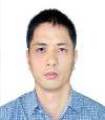
Dr. Nguyen Hung Minh
Senior Researcher, Vietnam Environmental Administration, Vietnam
Dr. Nguyen Hung Minh is senior researcher in Northern Center for Environmental Monitoring, Vietnam Environment Administration (VEA). He is in charge of an analytical laboratory for toxic chemicals in various environmental compartments, especially for persistent organic pollutants such as PCDD/Fs, PCBs, PBDEs, OCPs, etc. Dr. Nguyen Hung Minh is principal investigator of several studies on concentration and bioaccumulation of Agent Orange/Dioxin in the environment of Vietnam. His research topics are expended toward contamination of other emerging POPs and PTS in Vietnam.
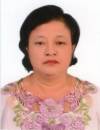
Prof. Ohn Mar
Professor/Head in Department of Physiology, University of Medicine 1, Yangon, Myanmar
Prof. Ohnmar is Professor/Head in Department of Physiology, University of Medicine 1, Yangon. She is a chairperson of the Post-graduate Board of Studies (Physiology) for mastery and doctorate course in University of Medicine 1, Yangon and a member of the Post-graduate Board of Studies (Physiology) for mastery and doctorate course in other 4 medical universities in Myanmar. She is also a member of the Research and Ethics committee, University of Medicine 1, Yangon. She has experience in supervision of many master student research and doctoral student research. She is doing a collaborative research with NIES on air quality assessment in Yangon city and some major cities in Myanmar. She is planning to expand the scope of the air pollution research on health impact and molecular changes on exposure to PM2.5.

Dr. Tippawan Prapamontol
Senior Researcher, Chiang Mai University, Thailand
Dr. Tippawan Prapamontol is a senior researcher with biochemistry and environmental toxicology background. She has led environmental health research projects in both pesticides and air pollution exposures and health impacts. She currently advises five full-time PhD students of the Environmental Science Graduate Program of Chiang Mai University with international co-trainings. Biomonitoring of pesticide exposure among reproductive-age farmers/farmworkers as well as pregnant mothers and their children are of special interest. Co-exposure to indoor/outdoor air pollutants among upper northern Thais where lung cancer incidence has been the highest in the countries is also of interest especially biomarkers of early diagnosis. 42

Dr. Kongkea Phan
Dean, International University, Phnom Penh, Cambodia
Dr. Kongkea PHAN was trained as a Biochemist at Royal University of Phnom Penh. He obtained his MSc and PhD in Environmental Science and Engineering from Gwangju Institute of Science and Technology, Korea and his Postdoc from United Nations University-International Institute for Global Health, Kuala Lumpur, Malaysia. He is now serving as a Dean of Faculty of Science and Technology, International University, Cambodia. Dr. Kongkea PHAN is a member of Cambodian Chemical Society and is serving as an Editor of the Environmental Geochemistry and Health, Editorial board member of the Applied Environmental Research. He is the author of more than 20 indexed journal articles, 2 chapters and 2 books and has published more than 30 conference paper and/or proceedings. His research interest mainly focuses on environmental contamination and health risk assessment and development of exposure biomarker, but not limited to water quality analysis and appropriate technologies for drinking water treatment.

Dr. Otgonjargal Damdinbaljir
Senior Researcher, National Centre of Public Health under the Ministry of Health, Mongolia
Dr. Otgonjargal was formally trained as pediatrician and conducting research on environmental pollution on human health, nutritional status of mothers and children. The main focus of the study is the health of the public, the health of the mothers, the children's health, the health effects of the pollution and the nutrition of the population. She worked on the Asian Development Bank (JFP9131) project to improve the chronic malnutrition of under 5 years old children and the common risk of non-communicable diseases and the mortality rate of the population in relation to air pollution. Currently, She is working relentlessly in the following areas and goals: to study and create an evidence-based knowledge on environmental, social and economic factors influencing the health and well-being of our fellow Mongolians; to have the research findings reflected in the decision-making process at all levels; to engrain healthy attitudes and change the risky behaviors of our citizens; and to foster a healthy, safe and supportive environment for every Mongolian. 44

Dr. Ketkesone Phrasisombath
Senior Lecturer, University of Health Sciences, Laos
Dr. Ketkesone is senior lecturer in public health and currently involved in strengthening the educational and research system development of University of Health Sciences, Laos. As part of the career, he provides guidance to all levels of health system research and primary health development with good mix of ten years monitoring and evaluation experience at the Government of Laos, United Nations agencies, international organizations, international NGOs. He is also passionate in environmental health and primary health care.

Dr. Ikuro Kasuga
JICA Expert, Vietnam Japan University, Vietnam
Dr. Ikuro Kasuga is an associate professor in Department of Urban Engineering at The University of Tokyo, Japan. He obtained his Ph.D on the relationship between dissolved organic matter and bacterial community in a source water from The University of Tokyo in 2005. Since 2006, he has worked at the University of Tokyo. His research interests include biological drinking water treatment, control of bacterial regrowth in premise plumbing, antibiotic resistant microorganisms in aquatic environment, microbial loop in a lake environment, and characterization of dissolved organic matter by high resolution mass spectrometry. Since September in 2018, he has been dispatched to Vietnam Japan University in Hanoi as a JICA expert to support Master Program in Environmental Engineering.

Dr. Marcin Pawel Jarzebski
Project Researcher, The University of Tokyo Institute for Advanced Study, Integrated Research System for Sustainability Science, Japan
Marcin Pawel Jarzebski is a post-doctoral researcher at the Integrated Research System for Sustainability Science (IR3S), University of Tokyo. For his current research work he studies the food security effects of industrial crop expansion in Sub-Saharan Africa, and climate change adaptation capacity development processes in Indonesia. He obtained his PhD from the Graduate Programme in Sustainability Science - Global Leadership Initiative Program (GPSS-GLI) at the University of Tokyo in 2015. During his PhD he explored community resilience of indigenous and non-indigenous community forestry groups in the Philippines. For his previous work he was engaging GIS systems for biomass estimation and loss over the time in the protected areas in Poland (Nicolaus Copernicus University); and GIS application to disaster management in the flood-prone areas of informal settlements in Manila, Philippines (The University of the Philippines).

Prof. Tsuyoshi Fujita
Director, National Institute for Environmental Studies, Japan
Prof. Tsuyoshi Fujita is a Director for Center for Social and Environmental Systems Research at National Institute for Environmental Studies (NIES), Japan. He also serves as Specially Appointed Professor at the Tokyo Institute of Technology in the field of applied energy, and Alliance Professor at Nagoya University in the field of environmental science. His research fields include eco-industrial development, low carbon cities, urban environment simulation systems, circular economy planning, and spatial life cycle assessment, and he has published more than 70 journal papers related to these fields to date. He is engaged in several national research projects to develop integrative urban technologies and policy simulation systems for Japanese and Asian cities and regions. Prof. Fujita is a member of Council for promotion of FutureCity Initiative of Cabinet Office of Japan, and he also holds a number of other academic positions including Counselor of the International Society for Industrial Ecology and Chair of the Committee on Environmental Systems, Japan.

Dr.Akimasa Sumi
Professor Emeritus, The University of Tokyo Institute for Advanced Study, Integrated Research System for Sustainability Science, Japan
He was born in 1948 at Gifu City. He entered the University of Tokyo in 1967 and graduated from the department of Physics in 1971. After a two-year master course, he joined the Japan Meteorological Agency. He got a D.SC from UT in 1985 and moved to UT as an associate professor in the department of geophysics. In the University, he was engaged in many research fields, such as ENSO related research, and model development projects. He established CCSR (Center for Climate System Research) in 1991 and also engaged in Sustainability Science Project in 2001. He retired in 2013 and now is a Professor Emeritus. He is a former President of the National Institute for Environmental Studies (NIES).

Dr. Lan Huong Nguyen
Lecturer, National University of Civil Engineering, Vietnam
I have been working in the field of environmental engineering and water resources management for the past ten years. I am lecturer at the Faculty of Environmental Engineering. I obtained my Bachelor degree at the National University of Civil Engineering, majoring in Environmental engineering. I hold Master and PhD degree from the Graduate Program in Sustainability Science, University of Tokyo. I participate in several projects related to climate change adaptation in the water sector in Vietnam; higher education projects in the field of sustainable science and climate change. I also involved in establishment of new bachelor program in Urban Sustainability and Climate Change at the National University of Civil Engineering, Vietnam. My research interests are climate change adaptation and mitigation in the water sector, water resources management, water and wastewater engineering.

Dr. Avishek Datta
Associate Professor, Asian Institute of Technology, Thailand
Dr. Datta has more than 11 years of international experience in research, consultancy, and capacity building in the areas of sustainable crop production, crop water management, climate change and food security, climate-smart agriculture, crop stress tolerance, conservation agriculture, organic farming, and integrated nutrient and pest management. A total of 6 Doctoral and 35 Master students have been graduated under his direct supervision. He has published 8 book chapters and more than 80 papers in international peer-reviewed journals. He has implemented several research, development, and outreach projects in various countries including Australia, Bangladesh, Cambodia, Lao PDR, Myanmar, Nepal, Thailand, Timor-Leste, USA, and Vietnam funded by many international donor agencies. Dr. Datta has received several awards and honors including Distinguished Research Award (2018); Distinguished Teaching Award (2016, 2015); ScienceDirect Top 25 Hottest Articles (2011); Featured Article (Weed Science Society of America, 2010); Top Cited Article (Weed Science Society of America, 2009).

Prof. Rizaldi Boer
Executive Director, Bogor Agricultural University, Indonesia
Prof. Rizaldi Boer is currently Executive Director of Centre for Climate Risk and Opportunity Management in Southeast Asia and Pacific of Bogor Agricultural University. He has been working on issues related to GHG mitigation strategies focusing on agriculture, forest and other land uses since 1998. Now, he is very active in conducting a number of studies related to policies toward low carbon development. Some of his recent works related to LCD are Low carbon development strategies of Bengkalis District-Riau Province that reduce pressure on peat-land ecosystems, reducing agricultural expansion into forests: Analysis of implementation and financing gaps and supporting local governments in the development of local appropriate mitigation action (LAMA-Indonesia) in South Sumatra and Papua Province. He obtained his PhD degree in Agriculture from University of Sydney, Australia in 1994.
-
Prof. Dr. Mai Trong Nhuan (Former President, Vietnam National University, Vietnam)
-
Prof. Motoo Furuta (Rector, Vietnam Japan University, Vietnam)
-
Dr. Vilas Nitivattananon (Associate Professor, Asian Institute of Technology, Thailand)
-
Dr. Tomonori Ishigaki (Senior Researcher, National Institute for Environmental Studies, Japan)
-
Dr. Chart Chiemchaisri (Associate Professor, Kasetsart University, Thailand)
-
Mr. Rawit Thaweesub (Lecturer, Rangsit University, Thailand)
-
Dr. Kosuke Nakamura (Research Associate, National Institute for Environmental Studies, Japan)
-
Ms. Rieko Kubota (International Project Coordinator, National Institute for Environmental Studies, Japan)
-
Ms. Han Hoang (Junior Research Associate, National Institute for Environmental Studies, Japan)
-
Dr. Tomonori Ishigaki (Senior Researcher, National Institute for Environmental Studies, Japan)
-
Dr. Satoshi Kameyama (Senior Researcher, National Institute for Environmental Studies, Japan)
-
Dr. Nguyen Thi Kim Cuc(Associate Professor,Thuyloi University, Vietnam)
-
Dr. Sangam Shrestha (Associate Professor and Program Chair, Asian Institute of Technology, Thailand)
-
Health Vulnerabilities, and Response Preparedness of Myanmar (Migrant) Women to Climate Change and Variability in Golden Triangle Area, Greater Mekong Sub-regionDr. Wynn Htut Aung (Ph.D Candidate, Mahidol University, Thailand)
-
Dr. Bui Quang Hung (Director, University of Engineering and Technology, Vietnam National University, Vietnam)
-
Mr. Try Thy (Executive Director/Editor-in-Chief, Open Development Cambodia, Cambodia)
-
Dr. Ying Lu (Associate Researcher, Yunnan University, China)
-
Dr. Makoto Tamura (Associate Professor, Ibaraki University, Japan)
-
Dr. Satoshi Kameyama (Senior Researcher, National Institute for Environmental Studies, Japan)
-
Dr. Chiho Watanabe (President, National Institute for Environmental Studies, Japan)
-
Dr. Nguyen Hung Minh (Senior Researcher, Vietnam Environmental Administration, Hanoi, Vietnam)
-
Prof. Ohn Mar (Professor/Head in Department of Physiology, University of Medicine 1, Yangon, Myanmar)
-
Dr. Tippawan Prapamontol (Senior Researcher, Chiang Mai University, Thailand)
-
Dr. Kongkea Phan (Dean, Faculty of Science and Technology, International University, Cambodia )
-
Dr. Otgonjargal Damdinbaljir (Senior Researcher, National Centre of Public Health, Ministry of Health, Mongolia)
-
Dr. Ketkesone Phrasisombath (Senior Lecturer, University of Health Sciences, Laos)
-
Dr. Ikuro Kasuga (JICA Expert, Master Program in Environmental Engineering, Vietnam Japan University, Vietnam)
-
Dr. Marcin Pawel Jarzebski (Project Researcher, The University of Tokyo Institutes for Advanced Study, Integrated Research System for Sustainability Science, Japan)
-
Dr. Shoji F. Nakayama (Head, National Institute for Environmental Studies, Japan)
-
Prof. Akimasa Sumi (Professor Emeritus, The University of Tokyo Institutes for Advanced Study, Integrated Research System for Sustainability Science, Japan)
-
Prof. Kensuke Fukushi (Professor, The University of Tokyo Institutes for Advanced Study, Integrated Research System for Sustainability Science, Japan)
-
Dr. Lan Huong Nguyen (Lecturer, National University of Civil Engineering, Vietnam)
-
Mr. Naoya Tsukamoto (Director, AIT Regional Resource Centre for Asia and the Pacific, Thailand)
-
Dr. Avishek Datta (Associate Professor, Asian Institute of Technology, Thailand)
-
Prof. Rizaldi Boer (Professor, Bogor Agricultural University, Indonesia)
Water Environment and Ecosystem
-
P1. Assessment of the Toxicity in the River Water in Hanoi on Daphnia MagnaThuy Chung Nguyen, Hanoi University of Science and Technology, Vietnam
-
P2. Water Quality in Thanh Luong Rice Vermicelli and Fresh Noodle Craft Village, Thanh Oai District, Hanoi, VietnamNguyen Thi Hoang Ha, University of Science, Vietnam National University, Vietnam
-
Kyoshiro Hiki, National Institute for Environmental Studies, Japan
-
P4. Species Composition and Metal Accumulation in Zooplankton in Truc Bach LakeHong Pham Thi, Hanoi University of Science and Technology, Vietnam
-
Manabu Onuma, National Institute for Environmental Studies, Japan
-
P6. Isolation and Screening Cellulose and Organic Matter Degrading Bacteria from Aquaculture Ponds for Improving Water Quality in AquacultureTon That Huu Dat, Vietnam Academy of Science and Technology, Vietnam
-
P7. Occurrence of Antibiotic Resistance Genes as Emerging Contaminants in Watersheds of Tama River and Lake Kasumigaura in JapanNga Nguyen Thi, Vietnam Japan University, Vietnam
-
P8. Persistent Toxic Substances in Vietnam Environment: Contamination, Human Exposure and Impacts, and Future PerspectivesTrinh Thi Tham, Hanoi University of Natural Resources and Environment, Vietnam
-
P9. Human Exposure to Endotoxin Associated with Water Use in Disaster EventsKeisuke Kuroda, National Institute for Environmental Studies, Japan
Water Treatment and Related Technology
-
Lan Huong Pham, University of Science, Vietnam National University, Vietnam
-
P11. Removal of Organic Matter from Piggery Wastewater by Anaerobic Technology in Fixed and Moving Bed Reactors (FBR and MBR)Thi Ha Nguyen, University of Science, Vietnam National University, Vietnam
-
Kazuhiro Komatsu, National Institute for Environmental Studies, Japan
-
Lan Huong Pham, University of Science, Vietnam National University, Vietnam
-
Truong Nguyen Xuan, Hanoi University of Science and Technology, Vietnam
-
Thi An Hang Nguyen, Vietnam Japan University, Vietnam
-
P16. An Approach: Nanomaterial – Based Advanced Oxidation Process of Ozonation for Wastewater TreatmentThi Thom Dang, Vietnam Academy of Science and Technology, Vietnam
-
P17. The Kinetic of Decolorizing Reactive Orange 122 (RO122) by Peracetic Acid in the Presence of Metal Ions and UV LightNguyen Thi Kim Giang, Hanoi University of Education, Vietnam
-
Thị An Hang Nguyen, Vietnam Japan University, Vietnam
-
P19. Removal Dye from Waste Water in Textile Village of Viet Nam by Low Cost Adsorbent Created from Treated SawdustHong Pham Thi, Thuyloi University, Vietnam
-
Manh Khai Nguyen, University of Science, Vietnam National University, Vietnam
-
P21. Sulfonated Polystyrene Waste in Liquid Phase as Ion-exchange Material to Remove Cr (III) in Aqueous SolutionLinh Chi Nguyen, University of Science, Vietnam National University, Vietnam
-
P22. Green Approach to Landfill Leachate Treatment Using Biocoagulants Extracted from Moringa Oleifera SeedsHuong Le, Thuyloi University, Vietnam
-
Ngoc Nguyen Thi, Kyoto University, Japan
-
P24. Metal Hydride-based Hydrogen Storage in Fuel Cell Application towards a Future Hydrogen SocietyViet Bac T. Phung, Vietnam Japan University, Vietnam
-
Tran Van Quy, University of Science, Vietnam National University, Vietnam
-
P26. Nanosilica Synthesis from Rice Husk and Application for Soaking SeedsNguyen Xuan Huan, University of Science, Vietnam National University, Vietnam
-
P27. Development of Stable Superhydrophobic Fabric with ZnO Coating for Selective Separation of Oil/Organic Solvent and WaterTran Thi Viet Ha, Vietnam Japan University, Vietnam
-
P28. Evaluation of Biochar Adsorbents by Waste-To-Product Approach to Remove Fluoroquinolone Antibiotic from Aqueous SolutionThuy Linh Nguyen, Katholieke Universiteit Leuven, Belgium
-
P29. Changes in Wastewater Treatment Technology toward Sustainable DevelopmentThe Ha Cao, University of Science, Vietnam National University, Vietnam
-
P30. Carbon, Nitrogen, Phosphorus Mass Balance Analysis for Septic Tanks in Ha Noi, Viet NamTan Loi Huynh, Kyoto University, Japan
Climate Change
-
Thida Tieng, Asian Institute of Technology, Thailand
-
P32. Time Series of Flood Mapping in the Mekong Delta using High Resolution Satellite ImagesDieu Anh Dinh, University of Cádiz, Spain
-
Thi Hieu Bui, National University of Civil Engineering, Vietnam
-
Yukio Terao, National Institute for Environmental Studies, Japan
-
P35. Integrated Solutions for Sustainable Development in the Mekong Delta – Land, Water, Energy and Climate–(ViWaT-Engineering project)Van Cam Pham, Karlsruhe Institute of Technology, Germany
-
P36. Research on Technical Renovating the Raw Water Intake Facility of the Water Treatment Plant to Improve the Water Security in the Flood Season for Son La CityMinh Duc Nguyen, Thuyloi University, Vietnam
-
P37. Soil Erosion and Overland Flow from Acacia Plantation Forest in Headwater Catchment of VietnamBui Xuan Dung, Vietnam National University of Forestry, Vietnam
-
P38. Groundwater Monitoring for Evaluating the Pasture Carrying Capacity and its Vulnerability in Arid and Semi-arid Regions: A Case Study of Urban and Mining Areas in MongoliaTomohiro Okadera, National Institute for Environmental Studies, Japan
Air Pollution
-
Nguyen Thi Hiep, Nhat Bao Environmental Technologies Joint Stock Company, Vietnam
-
Tin Tin Win Shwe, National Institute for Environmental Studies, Japan
-
Dat Macvan, National University of Civil Engineering, Vietnam
-
Shinichi Enami, National Institute for Environmental Studies, Japan
-
P43. Assessment of the Relationship between Air Temperature and Mental Health of the Elderly in Thai Binh, Phu Tho and HanoiVu Kim Duyen, Vietnam Japan University, Vietnam
-
Toshinori Ariga, National Institute for Environmental Studies, Japan
Sustainability Science and SDGs Issues
-
P45. Gender Inclusiveness and Empowerment in Shared Water Resource Management in the Context of Climate Change - A Case Study in the Vietnamese Mekong DeltaThai Van Nguyen, An Giang University, Vietnam
-
Shoji F. Nakayama, National Institute for Environmental Studies, Japan
-
Hiroomi Takemori, WORKLOUNGE 03- VIETNAM co., ltd, Vietnam
-
P48. Climate Finance for Sustainable Growth in Southeast Asian CountriesLe Ngoc Dang, Academy of Finance, Vietnam
-
P49. Environmental Consequence of Product Lifetime Change Policy for Consumer DurablesDaisuke Nishijima, National Institute for Environmental Studies, Japan
-
The Ha Cao, University of Science, Vietnam National University, Vietnam
-
P51. Sustainability of Traditional Vermicelli Production in Minh Hong Village, Ba Vi District, Hanoi, VietnamNguyen Thi Hoang Ha, University of Science, Vietnam National University, Vietnam
-
Seiya Maki, National Institute for Environmental Studies, Japan
-
P53. Migration Journeys: The Experiences of Ethnic Minority Men and Women in Vietnam – China Border AreasNgan Lu, Vietnam Women’s Academy, Vietnam
-
P54. Potential and Method for Effective Using of Biomass from Agricultural By-products (Paddy, Maize, Peanut) in Northern of VietnamVan Quy Tran, University of Science, Vietnam National University, Vietnam
-
P55. Assessing Sustainability of Orange Farming in Cao Phong District, Hoa Binh ProvinceTran Thi Tuyet Thu, University of Science, Vietnam National University, Vietnam
Best Poster Award
-
January 23 - 24, 2019, at Pan Pacific Hanoi, Vietnam
-
January 23 - 24, 2018, at Seri Pacific Hotel, Malaysia
-
January 26 - 28, 2017, at Udayana University, Indonesia
-
January 27 - 28, 2016, at Asian Institute of Technology, Thailand
